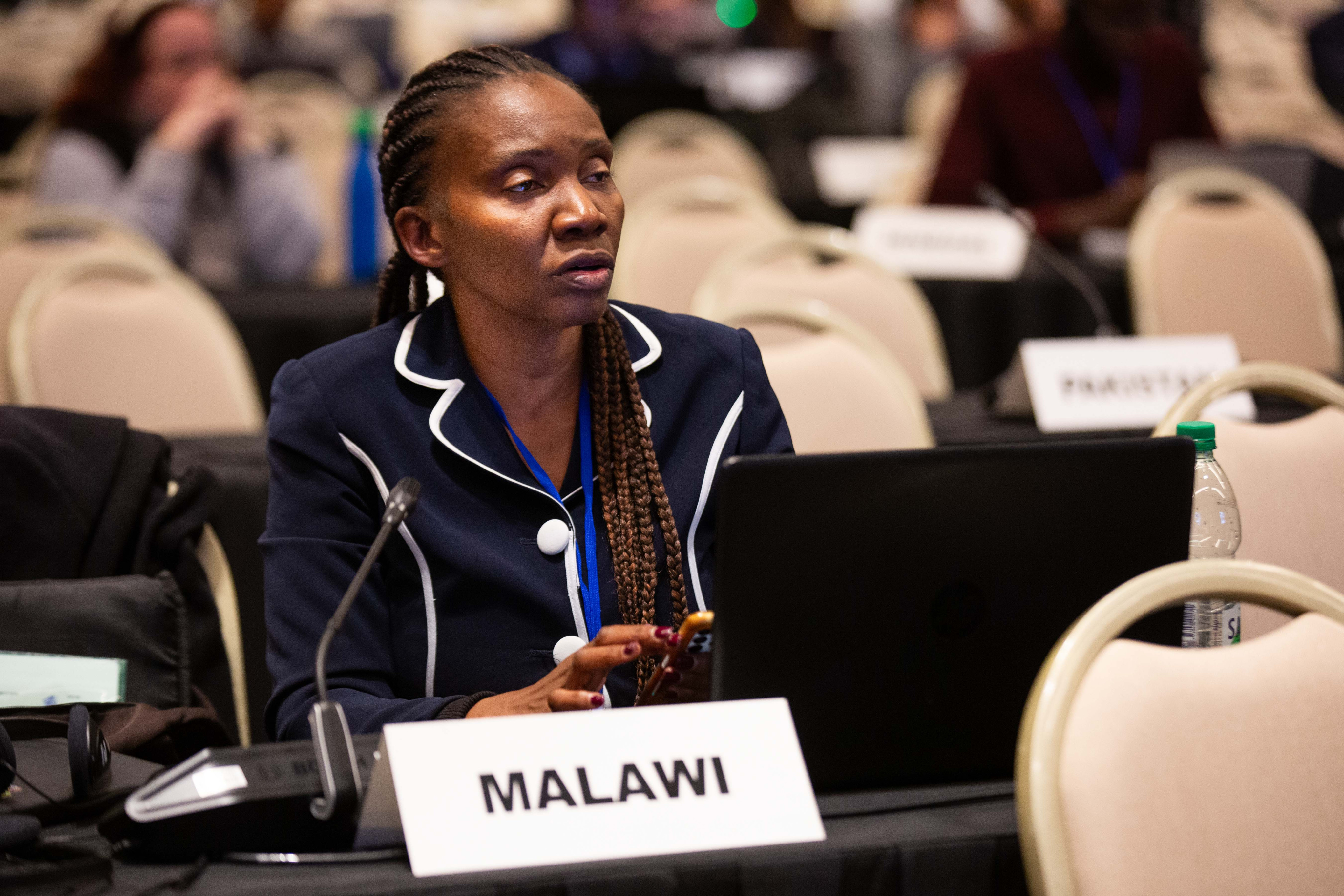Lilongwe, Malawi – In a modest office tucked within Malawi’s Environmental Affairs Department, Caroline Theka – Principal Environmental Officer – reflects on a National Implementation Plan (NIP) journey that has spanned nearly two decades. A journey woven through shifting priorities, scarce resources, and yet, an unwavering commitment to protect communities from the invisible dangers of Persistent Organic Pollutants (POPs).
“We started back in 2004, 2005,” she says, referencing Malawi’s first NIP under the Stockholm Convention. Since then, Malawi has revised its NIP twice—most recently in 2019, and now again in the face of emerging chemicals and evolving realities. The path has been far from easy. Yet, as Caroline speaks, it’s clear that the country’s resolve has only strengthened.
From First Steps to Frameworks
Early progress laid the foundation. Inventories were developed for PCBs and obsolete pesticides. Training sessions were held for stakeholders in key sectors like agriculture and waste management. The first NIPs in Malawi also triggered reforms in legal frameworks—the Pesticides Control Act and the Environment Management Act were updated, with the latter incorporating POPs as early as 2017.
“Even then, we had the foresight to include a clause in our regulations that allows for automatic updates when new POPs are listed under the Convention,” Caroline explains with quiet pride.
Still, she is quick to acknowledge the gaps that persist. Implementation has been hindered by limited technical and financial resources. “There hasn’t been much national budget allocation to support POPs' work,” she says. “And data collection—especially testing for POPs in products—remains a major hurdle.”
Modernizing Legislation, Bridging Gaps
Malawi’s Chemicals and Toxic Substances Regulations were updated and submitted to the Ministry of Justice in 2020. But without gazettement, implementation remains delayed.
“It’s something we’re pushing for,” Caroline says. “Especially with new POPs being added regularly, it’s vital our frameworks evolve.”
The Pesticides Act, last reviewed in 2018, does address POPs—but enforcement and interagency coordination continue to lag. Caroline points out the importance of institutional collaboration, particularly as sectors like agriculture and environment play vital roles in identifying and mitigating POPs risks. Despite these implementation hurdles, Malawi’s regulatory framework remains forward-looking and robust on paper. But strong laws alone are not enough. To understand the scale of the challenge, one must look beyond ministries and into Malawi’s farms and markets.
Reality on the Ground: The Awareness Gap
Across Malawi, farmers apply a wide array of pesticides—including insecticides, herbicides, fungicides, fumigants, and rodenticides—mainly on tobacco, tea, maize, cotton, and sugarcane. Yet many are unaware of the risks associated with hazardous chemicals, including persistent organic pollutants (POPs), or how to identify them in everyday products.
“POPs are very complicated and hard to explain. Even harder in local languages,” Caroline says. “How do you tell a farmer about the chemicals in a way that they understand and act upon?”
This communication gap is not unique to Malawi. In many developing countries, low literacy levels, limited access to extension services, and linguistic diversity complicate efforts to promote chemical safety. Caroline emphasizes that awareness raising must go beyond isolated campaigns. It should be continuous and delivered by outreach actors who both understand the technical aspects of POPs and can translate them into messages relevant to everyday life. “We can have good laws and policies,” she says, “but if farmers are unaware, or if harmful products remain in everyday use, we are still vulnerable.”
She also stresses the importance of inclusive, multidimensional outreach—targeting not only farmers but also pesticide vendors and other players in the supply chain. “These actors must be equipped with clear, accessible information,” she adds. “It’s about building an informed ecosystem, not just informing individuals.”
Keeping Knowledge Alive Across NIP Cycles
Recognizing the importance of institutional memory, Malawi took deliberate steps to retain knowledge from previous NIP cycles. Rather than relying on a single consultant, national experts were engaged across key sectors and worked closely with the coordination unit to ensure that expertise remained embedded within ministries.
“It was a strategic decision,” Caroline notes. “People retire, people move on. But if knowledge stays in the system, we’re better off.”
Efforts are also underway to digitize data, develop standard operating procedures, and sustain regular inter-ministerial collaboration—ensuring continuity even when personnel change. These internal systems are essential, but they must be complemented by stronger data and technical capacity—especially to meet the demands of a more complex and evolving POPs landscape.
The Challenge of Data and Testing
As Malawi embarks on its current NIP review, the challenges loom large.
“Data. That’s the biggest issue that we anticipate in our upcoming NIP,” Caroline says. “Customs gathers import data, but it’s not always in a usable format. We’ve asked for better data, but it’s a work in progress.”
Testing capacity is another major barrier. Specialized equipment, reagents, and trained technicians are in short supply. “Even if we suspect a product contains POPs, we can’t verify it,” she explains. “And without laboratory data, our evidence base remains weak.” The absence of POPs-specific analytical facilities in the country severely constrains efforts to accurately identify POPs in products—particularly beyond legacy substances like PCBs and pesticides. Developing in-country analytical and monitoring capacity would greatly enhance Malawi’s ability to monitor compliance, support enforcement actions, and address the growing number of newly listed POPs under the Stockholm Convention.
Fostering a Culture of Prevention
Building on awareness efforts, Caroline sees an opportunity to embed a stronger culture of prevention across all levels of society. She highlights the need to strengthen communication channels between farmers, vendors, and national authorities.
“We need a system where people can report issues—say if a pesticide causes side effects, poisoning, or doesn’t work properly,” she says. “That feedback must reach central decision-makers who can act—whether it’s restricting a product or improving guidance.”
This preventative approach, she explains, is not just about reacting to crises, but embedding responsiveness and trust into the broader chemicals management system.
Turning Lessons into Action
Despite the obstacles, Caroline’s outlook remains hopeful. She envisions a Malawi where farmers are not only protected by law but empowered through knowledge; where pesticide safety is not just a policy goal, but a community norm.
“We’ve learned a lot,” she says. “And this time, we’re applying those lessons. With the right support, I believe we can get there.”
As Malawi moves forward with its updated National Implementation Plan, it does so not from a place of uncertainty—but from experience, reflection, and renewed commitment to the objectives of the Stockholm Convention.
To watch the full interview, please follow this link: Series of NIP Dialogues. Building on Experience of Malawi’s NIP Update
To learn more about the Global NIP Update project, visit Global NIP Update | Green Policy Platform



